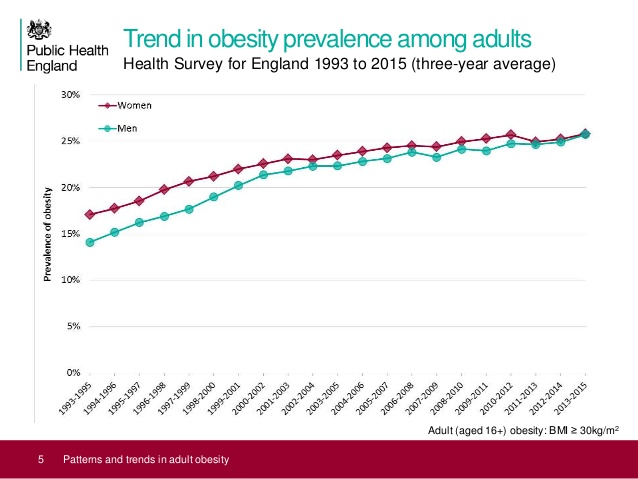Maths, English, Science…Nutrition?

Modern day ‘diet plans’ promoting weight loss are full of unattainable guidelines and false promises, with companies selling their products as a ‘quick fix for weight loss’. As there has been a growing demand for meal replacements and supplements, it is evident that people are searching for a solution to the problem of obesity, which costs the NHS nearly £4 billion annually 1 Obesity prevalence is rising worldwide, with predicted numbers of obese adults in the UK expected to rise by a further 11 million by 2030 2. Figure 1 shows the trend in obesity prevalence in recent years in the UK 3.
Alongside this increasing obesity epidemic, the weight loss and weight management market is growing, expected to reach a global market value of $260 billion globally in the year 2020 4. If the weight management market is on an exponential rise, why is obesity not correspondingly falling? Almost everyone has believed a ‘diet myth’ or bought into weight loss programs and supplements at some point in their life, yet few have lasting results to show for it. The majority of the adult population have very little knowledge of macronutrients, calories, or the calculations involved for effective weight loss. So, to prevent the next generations falling for the same lies, is it time we taught nutrition in schools?

Figure 1: The trend in obesity prevalence in England from 1993 to 2015, showing increasing prevalence in both genders. Credit: Public Health England (PHE), 2015.
In the last 100 years diet and nutrition habits have changed dramatically, shifting from mainly fresh, farmed foods to mass-market fast food. Alongside this, lifestyle changes in the population have lead to lower levels of physical activity and a corresponding increased incidence of heart disease, diabetes, and obesity, all of which are now at the highest levels the UK has ever seen. Over the last few decades, there has also been a worldwide rise in childhood obesity, linked to an increased risk of asthma, diabetes and heart disease carried into adulthood 5. In schools, the nutritional content of provided meals is constantly criticised, and physical activity in schools has fallen by over 80% in the last 50 years 6. There are many reasons and risk factors contributing to the obesity epidemic, however, underlying much of this is the lack of knowledge adults have regarding nutrition. Incorporating a food and nutrition class into the curriculum in schools would mean children would become better informed, in turn increasing knowledge in the adult population.
A 2009 study into childhood obesity trends and prevalence in the UK found a strong inverse relationship between parental education and childhood obesity 7. Further evidence of education helping to reduce obesity comes from a study in 2008. This pilot study was conducted to determine the impact of furthering nutritional knowledge through a prescribed short-term curriculum on the eating behaviours of middle school children. This study used a total of 576 students, split into either an intervention group, who were given nutritional training, or a control group, given no training. Eating behaviours and expectations regarding healthy eating were assessed by questionnaires using three subscales to determine differences pre- and post-intervention. It was found that the intervention group were significantly more likely to eat fruit and vegetables, less likely to eat junk food, and they felt confident that they knew enough to make positive dietary changes to eat healthily 8. This evidence highlights that even a short-term increase in nutritional knowledge can positively influence eating behaviours. Therefore, a long-term curricular focus onfood and nutrition could be hugely beneficial, potentially having an even greater effect than that seen in the short-term study.
Nutritional ‘myths’ are often promoted in the modern day world. With companies marketing their products as the ‘best’, ‘easiest’ and ‘most cost effective’ way to lose weight, it seems consumers are easily targeted by marketing strategies. With a pool of ridiculous myths and fables out there, promising fast, easy, and long-lasting results for a battle that often lasts a lifetime, it is no wonder people are confused about what to believe. The problem with short-term ‘fad diets’ is often the weight gain that occurs after the dieting period ends. In reality, small and sustained changes to diet and increasing physical activity is the only proven way of achieving maintainable weight loss 9. The basic maths of calorie intake being lower than calorie output for fat loss to occur is well-understood. However, important issues such as the breakdown of calories into macronutrients, the nutritional content of the foods consumed daily by families, and risks associated with imbalances of these nutrients, remain poorly understood. Teaching young adults the science behind diets and nutrients in food, as well as its physiological impact in one’s body, would potentially prevent another generation of consumers falling for the ubiquitous dietary myths.
It has been said that knowledge is power and education is the key to success. If the average UK adult understood macronutrients, and knew the calorie content of the food they chose to eat, the ignorance surrounding food would be much reduced. The result could be a change of dietary behaviour and even potentially decreasing obesity rates. Knowing that a meal is 1,500 calories and splurging every once in a blue moon is one thing, but it is becoming evident that in society there is a lack of awareness of the high calorie content of foods people regularly eat. People are often shocked when they find out the average ‘burger and chips’ meal is over 1000 calories. What’s more, many options that people believe to be the ‘healthier’ choice are actually adding calories to their daily intake instead of reducing it. Learning nutrition from a young age could increase awareness and reduce detrimental nutrition choices.
The misconceptions, false beliefs, and lack of knowledge surrounding the things we eat to fuel our bodies needs to stop. The obesity battle continues and we cannot win without knowledge, hence the proposal to include a class for nutrition in high school curriculums. This would make the next generation more informed when it comes to making choices surrounding nutrition, and allow them the insight to make their diet choices based on scientific facts. Learning the benefits of balanced nutrition and increased physical activity, and disregarding ‘fad’ unsustainable diet products could eventually make a long term change to the obesity epidemic we currently face.
This article was specialist edited by Mollie Wilson and copy edited by Kirstin Leslie.
References
- Allender, S., and Rayner, M., (2007), The burden of overweight and obesity-related ill health in the UK, Obesity Review, Vol.8, Issue 5, pp.467-473.
- Wang, Y., McPherson, K., Marsh, T., Gortmaker, S., and Brown, M., (2011), Health and economic burden of the projected obesity trends in the USA and the UK, The Lancet, Vol 378, Issue 9793, pp.815-825.
- Public Health England, (2015), Increasing prevalence of obesity in England from 1993 to 2015, Public Health England.
- IT, Industry Today, (2017), Weight loss and weight management market 2016, market size, share, trends, opportunities and forecast, Industry Today
- Allcock, D., Gardner M., and Sowers, J., (2009), Relation between childhood obesity and adult cardiovascular risk, International Journal of Pediatric Endocrinology, pp.108-187.
- NHS, (2017), Statistics on Obesity, Physical Activity and Diet, National Health Service
- Stamatakis, E., Wardle, J., and Cole, T., (2010), Childhood Obesity and overweight prevalence trends in England: evidence for growing socioeconomic disparities, International Journal of Obesity, Issue 34, pp.41-17.
- Fahlman, M., Dake, J., McCaughtry, N and Martin, J., (2008), A Pilot Study to Examine the Effects of a Nutrition Intervention on Nutrition Knowledge, Behaviours and Efficacy Expectations in Middle School Children, Journal of School Health, Vol. 78, Issue 4, pp.216-222.
- Navarro, S., and Pérez-Llamas, F., (2013), Errors and myths in feeding and nutrition: Impact on the problem of obesity, Nutricion Hospitalaria, Vol. 28, pp.81-88.










